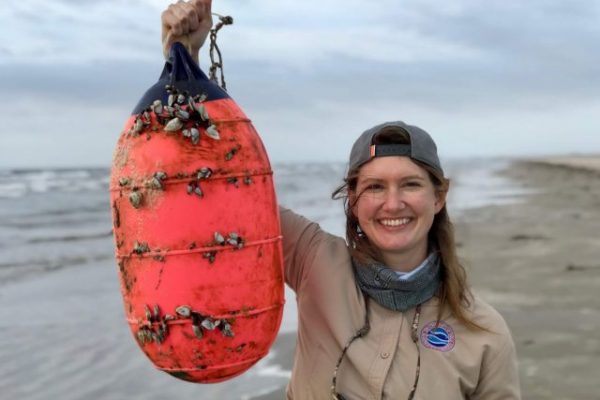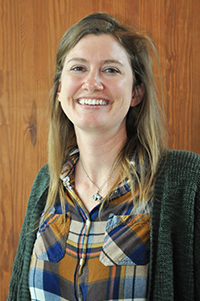Kelly Dunning, an assistant professor in the School of Forestry and Wildlife Sciences at Auburn University, is one of 20 scientists nationwide to receive a 2020 Early Career Research Fellowship from the Gulf Research Program of the National Academies of Sciences, Engineering and Medicine.
Each fellow has received a financial award of $76,000 in addition to mentoring support and a built-in community of colleagues who share an interest in the well-being of Gulf Coast communities and ecosystems, the National Academies stated.
“The early years of a researcher’s career are a critical time,” said Gulf Research Program Executive Director Lauren Alexander Augustine. “This program gives fellows the independence and flexibility to explore untested ideas and develop lasting collaborations. The 2020 class of fellows is a distinguished group of individuals who have demonstrated superior scholarship, exceptional scientific and technical skills and the ability to work across disciplines.”
Fellowship awardees, all tenure-track faculty members at colleges, universities and research institutions, were selected for their preparation to work at the intersections of environmental health, community healing and resilience and offshore energy system safety in the Gulf of Mexico and other U.S. coastal regions.
This fellowship offers Dunning a unique opportunity: It is not attached to a specific project, so she and other recipients are free to use the financial support to pursue non-traditional research that they otherwise might not be able to conduct.
Dunning is clear on the research she will pursue.
“I am recruiting a master’s student to help me study the ongoing Everglades restoration work that is near and dear to my heart, as I grew up watching alligators swim around the Glades,” she said. “I will also study the policy of allowing states to manage red snapper populations in Gulf states. I am interested in how public policy impacts local ecosystems, and red snapper and the Everglades are two fantastic cases of this topic.”
Growing up, she played in the man-made drainage canals that are part of the Everglades’ system restoration, “literally catching turtles and small fish by hand for hours every day.”
“What’s happening in the Glades restoration occurs at the intersection of human intervention, decision-making and environmental health and is representative of problems and solutions that matter to the entire Gulf,” she said.
That deep devotion to the Everglades dovetailed with her passion for saltwater angling—redfish nearshore and red snapper offshore—and hunting waterfowl in the Gulf’s marshes.
“These activities bring people together and unite really diverse groups of people to support state-level management and conservation,” Dunning said. “My research on fishing and Everglades restoration bears a direct relationship to who I have always been, and it is an honor to receive this award.”
Dunning thanked her mentors on this project: Graeme Lockaby, associate dean of research in the School of Forestry and Wildlife Sciences, and Jace Tunnell, director of the Mission-Aransas National Estuarine Research Reserve.
“Without their help, I would not have received this award,” Dunning said. “They will help me ensure my fellowship will improve social and ecosystem well-being in the Gulf.”
Lockaby said he and the rest of the school are pleased that Dunning received the fellowship and encouraged that her work will bring about important change.
“Dr. Dunning’s research centers on a very critical issues: the socio-economy of coastal communities faced with rising unemployment, threatened resource bases and increasing frequency of occurrence of natural disasters,” Lockaby said. “Specifically, she will clarify the underlying factors driving this socioeconomic tangle and work with local citizenry to develop approaches for resolving some of the key problems inherent to those communities.
“Dr. Dunning’s use of the Gulf Coast as an outdoor laboratory is highly innovative and enables her to assemble very creative teams who understand every facet of coastal socioeconomics,” he said.
School of Forestry and Wildlife Sciences Dean Janaki Alavalapati said this recognition shines a light on the noteworthy contributions of faculty members, such as Dunning, who are quickly gaining momentum in their research efforts.
“This well-deserved fellowship presents a unique opportunity for Dr. Dunning to research a previously unexplored combination of scientific areas, which could lead to truly meaningful change,” Alavalapati said.
(Written by Teri Greene)











